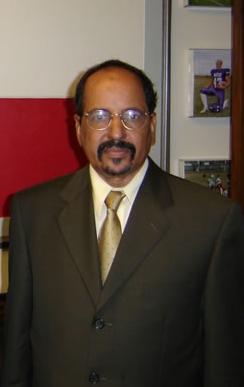Mohamed Abdelaziz (Sahrawi politician) facts for kids
Quick facts for kids
Mohamed Abdelaziz
محمد عبد العزيز |
|
|---|---|
 |
|
| 2nd President of the Sahrawi Republic | |
| In office 30 August 1976 – 31 May 2016 |
|
| Prime Minister | Mohamed Lamine Ould Ahmed Bouchraya Hammoudi Bayoun Mahfoud Ali Beiba Abdelkader Taleb Omar |
| Preceded by | Mahfoud Ali Beiba (Acting) |
| Succeeded by | Khatri Addouh (Acting) |
| Personal details | |
| Born | 17 August 1946 Marrakesh, Morocco or Smara, Spanish Sahara |
| Died | 31 May 2016 (aged 69) Tindouf, Algeria |
| Political party | Polisario Front |
| Spouse | Khadidja Hamdi |
| Alma mater | Mohammed V University |
Mohamed Abdelaziz (Arabic: محمد عبد العزيز; 17 August 1946 – 31 May 2016) was an important leader for the Sahrawi people. He served as the Secretary General of the Polisario Front from 1976. He was also the first President of the Sahrawi Arab Democratic Republic (SADR) from 1982 until his death in 2016.
Contents
Early Life and Beginnings
Mohamed Abdelaziz was born in 1946. His family was Sahrawi, a group of people who live in the Western Sahara region. They often moved between different areas like Western Sahara, Mauritania, Algeria, and Morocco.
His father, Khalili Erguibi, was involved in the Moroccan Liberation Army. He later joined the Royal Moroccan Army. Abdelaziz's brother, Mohamed Lahbib Rguibi, became a lawyer. He defended many Sahrawi human rights activists.
Becoming a Leader
While studying at the Mohammed V University in Rabat, Mohamed Abdelaziz became interested in Sahrawi independence. He helped start the Polisario Front in 1973. This group wanted Western Sahara to be free from Spanish colonialism. The Polisario Front had ideas based on Arab socialism.
After Spain left the area in 1975, the Polisario Front declared the Sahrawi Arab Democratic Republic (SADR). This led to the Western Sahara War (1975–1991). In 1976, Abdelaziz became the Secretary-General of the Polisario Front. He took over after El-Ouali Mustapha Sayed died.
From August 1982, Abdelaziz also became the first President of the SADR. This happened after the Polisario Front changed its rules. They decided that the Secretary-General would also be the President.
Leading the Sahrawi Republic
Mohamed Abdelaziz lived in refugee camps in Tindouf Province, Algeria. These camps were home to many Sahrawi people who had left Western Sahara. Under his leadership, the Polisario Front continued its fight against Morocco. They used guerrilla warfare tactics.
In the 1980s, Morocco built a long wall, called the Moroccan Wall. This wall made it harder for the Polisario Front to launch attacks. So, Abdelaziz focused more on diplomacy. He tried to gain support for the SADR through peaceful talks.
International Recognition
Abdelaziz worked hard to get other countries to recognize the Sahrawi Republic. In 1982, the Organization of African Unity (OAU) accepted Western Sahara as a member. This was a big step for the SADR. Morocco disagreed strongly and left the OAU two years later.
In 1985, Abdelaziz was chosen as the Vice-President of the OAU. This showed that the Sahrawi Republic was becoming a permanent member. When the African Union (AU) replaced the OAU in 2001, Abdelaziz was again elected as AU vice-president.
In 2005, he received the "Human Rights International Prize" from the Spanish Human Rights Association. This award recognized his efforts for human rights.
Mohamed Abdelaziz passed away on May 31, 2016, due to lung cancer.
Political Views
Mohamed Abdelaziz was seen as a leader who believed in a separate government and nation. He guided the Polisario Front towards finding peaceful solutions. For example, he supported the United Nations' Baker Plan in 2003. This plan aimed to find a way to resolve the conflict.
Some people within the Polisario Front had different ideas. They wanted to restart the armed struggle. However, Abdelaziz believed in continuing diplomatic efforts. He thought this approach would bring more lasting peace.
Abdelaziz always spoke out against terrorism. He said that the Polisario's fight was a "clean struggle." This meant it should not target regular people or their property. He aimed to defend the Sahrawi population through their actions.
See also
 In Spanish: Mohamed Abdelaziz para niños
In Spanish: Mohamed Abdelaziz para niños
 | Mary Eliza Mahoney |
 | Susie King Taylor |
 | Ida Gray |
 | Eliza Ann Grier |

